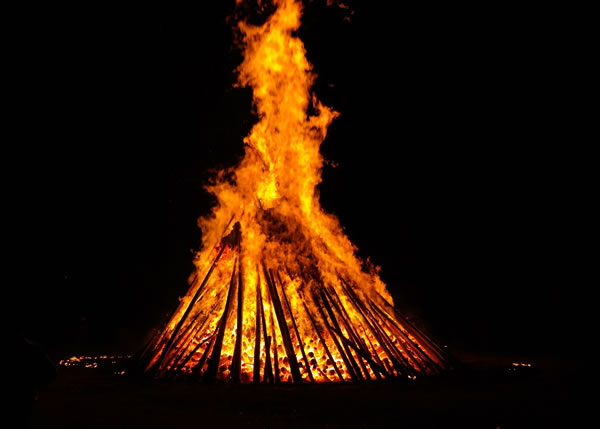Celebrating the St. John the Baptist’s Feast Day in Germany: dates, celebration, conventional congratulations, greetings, traditions and customs on the St. John the Baptist’s Feast Day
On this page you will find a description of the St. John the Baptist’s Feast Day festivities in Germany. Celebration dates by year, customs and traditions common for Germany on the St. John the Baptist’s Feast Day, a description of the origin, congratulations & greetings.
Dates for the St. John the Baptist’s Feast Day celebration in Germany
The date of the St. John the Baptist’s Feast Day celebration in Germany remains unchanged every year and falls on 24 June.
The St. John the Baptist’s Feast Day celebration date in Germany:
Wednesday 24 June 2026 .
Below is a list of dates for celebrating the St. John the Baptist’s Feast Day in Germany by year, provided that in previous and subsequent years the present practice and time of the holiday celebration is preserved:
- Tuesday, 24 June 2025 - St. John the Baptist’s Feast Day 2025Germany Germany
- Wednesday, 24 June 2026 - St. John the Baptist’s Feast Day 2026Germany Germany
- Thursday, 24 June 2027 - St. John the Baptist’s Feast Day 2027Germany Germany
- Sunday, 24 June 2029 - St. John the Baptist’s Feast Day 2029Germany Germany
Other names of the holiday
Holiday name in German: Johannistag.
We are not aware of any other names for the St. John the Baptist’s Feast Day in Germany.
Holiday status in the territory of Germany
St. John the Baptist’s Feast Day is not an extra non-working day in Germany.
Wishes and congratulations, greetings on the St. John the Baptist’s Feast Day in Germany
No information available.
Description of the St. John the Baptist’s Feast Day celebration: customs and traditions:
The birthday of St. John the Baptist is celebrated in many European countries, but in Germany it is not a public holiday, nor is it a day off from work. For information on the origin of the holiday, see the page below. The following traditions and customs are associated with this holiday.
Bonfire on the Day of the Nativity of St. John the Baptist
The night of June 23-24 (in German: Johannisnacht). plays a special role in the holiday. On this night, traditionally, bonfires are kindled (in German: Johannisfeuer, Sonnwendfeuer), young people jump over the fire. Previously, this ritual used to be believed to improve fertility, and the family, whose member jumped the highest over the fire, would get the richest harvest. Campfire dances also take place. The bonfire of St. John the Baptist is believed to ward off evil spirits, diseases and misfortunes from people and pets. Sometimes a straw doll is burned at the stake.
Elves and gnomes, fireflies, mermaids
For a long time, the feast of St. John the Baptist has been associated with a fairy world and magic, on the St. John Nativity night, mountains containing treasures open up, and you can also see elves and gnomes; the sound of bells is heard in the seas, people can understand the language of animals, magical light from fireflies (in German: Johanniswürmchen) can be seen in the forest, herbs and plant roots receive healing powers, etc.
Wreath or crown of St. John (in German: Johanniskrone)
This crown is made from tree branches and greenery, decorated with eggs, roses and other flowers and is hung outside. Earlier, dances were held around it in the evening. Elsewhere in Europe, John's crowns or wreaths are let float down the river.
Night festivities
On the Midsummer Night (St. John the Baptist feast), people take walks in the forest with lanterns in search of fireflies and for animal watching.
Other customs and traditions
In different places of Germany and other parts of Europe, other customs and traditions are practiced on Midsummer Day, for example: decorating fountains and celebrating by the fountains, making a hot John's cake (in German: Johanniskuchen), collecting herbs and flowers (bouquet of John), bathing in rivers and lakes (in German: Johannisbad), equestrian procession and others.
The origin of the St. John the Baptist’s Feast Day holiday
John the Baptist (or the Precursor) was a Jewish prophet who baptized repentant people in Judea, prior to the Jesus Christ preaching. According to the Bible, John the Baptist is six months older than Jesus Christ, so his Nativity is celebrated six months earlier than the Nativity of Christ.
The traditions and customs of this holiday have nothing to do with St. John the Baptist himself. Since the holiday falls on the beginning of summer (the beginning is considered June 21 - the day with the longest daylight hours), numerous pagan traditions and rituals associated with the summer onset and the solstice were timed to coincide with St. John the Baptist Day.
Photos, pictures for the holiday
To enlarge and view the picture, click on it with the mouse button.

Bonfire on the night of the St. John the Baptist Nativity (Johannestag): the most famous custom with dancing and jumping over fire
RU-GELD.DE Team
Last updated: